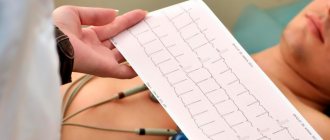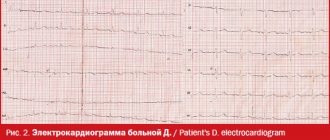The task of the cardiovascular system of the body is the uninterrupted supply of blood, and with it oxygen, nutrients to all human organs and tissues. Our well-being and overall health greatly depend on the coordinated operation of this system. Therefore, it is so important to know how your cardiovascular system functions, whether there are changes, and whether special drug support is needed to slow down the disease process at the initial stage of its development.
The “Healthy Heart” diagnostic program (check-up) is a comprehensive examination that allows you to obtain information about the state of the cardiovascular system, the presence of pathological processes and identify possible risks.
What is included in the diagnostic program “HEART AND VESSELS”
The check-up includes the most important studies for checking the heart and blood vessels:
- Clinical, biochemical and hemostasiological blood tests are needed to check for the presence of inflammation, hormonal imbalances, vascular conductivity and blood clotting. Often, other dangerous diseases are hidden under the symptoms of heart pathologies.
- X-ray of the lungs, ECG, ultrasound of the kidneys and thyroid gland, ECHO of the heart, vascular examination, daily monitoring of pressure and heart rate - these examinations will accurately tell you about the condition of the main organs responsible for the functioning of the cardiovascular system
- A cardiologist, neurologist and ophthalmologist will help you correctly interpret the results, not miss important details in the test results, make the correct diagnosis and prescribe the correct treatment
Program composition
Specialists of the consultation and diagnostic center at KGB No. 31 have developed various versions of the diagnostic program. Based on your doctor’s recommendations or on your own, you can choose the option that suits you. Comprehensive heart diagnostic program “Healthy Heart” standard version includes:
• Laboratory diagnostics (complete blood count, studies of cholesterol, triglycerides, lipoproteins, alpha-lipoproteins, creatinine, glucose, potassium, magnesium, sodium, chlorides in the blood); • Electrocardiogram (ECG – reading and description); • Echocardiography (ECHO-CG); • Consultation with a cardiologist based on the results of the examination ____________________________________________ The cost of the program is 10,000 rubles. The comprehensive program for diagnosing heart function “Healthy Heart”, optimal option, includes:
• Laboratory diagnostics (general urine test, general blood test, studies of protein levels, glucose, bilirubin, cholesterol, triglycerides, lipoproteins, alpha lipoproteins, creatinine, glucose, potassium, calcium, sodium, chlorides in the blood, hormones CT3, CT4, TSH ); • Instrumental diagnostics: – Electrocardiogram (ECG – reading and description); – Holter heart rate monitoring (HM-ECG); – X-ray of the lungs in 2 projections; • Ultrasound diagnostics: - thyroid and parathyroid glands - Echocardiography (ECHO-CG); • Consultation with a cardiologist based on the examination results. ____________________________________________ The cost of the program is 22,000 rubles. Comprehensive diagnostic program for the cardiovascular system “Healthy Heart” maximum option includes:
• Laboratory diagnostics (general urine test, complete blood count, studies of protein levels, glucose, bilirubin, urea, uric acid, cholesterol, triglycerides, lipoproteins, alpha lipoproteins, creatinine, glucose, potassium, calcium, sodium, blood chlorides, alkaline phosphatosis, hormones ST3, ST4, TSH); • Instrumental diagnostics: - Electrocardiogram (ECG - reading and description) - 24-hour blood pressure monitoring; — Holter heart rate monitoring (HM-ECG); — Bicycle ergometry; — X-ray of the lungs in 2 projections • Ultrasound diagnostics: — abdominal organs (complex); - kidneys and adrenal glands; — thyroid gland and parathyroid glands; — Echocardiography (ECHO-CG); — Duplex scanning of the veins of the lower extremities; — Triplex scanning of extracranial sections of brachiocephalic vessels. • Consultation with a cardiologist based on the results of the examination: - cardiologist; - ophthalmologist; - endocrinologist; - neurologist. ____________________________________________ The cost of the program is 50,000 rubles.
What will a cardiac check-up show?
Every fifth Moscow resident has a confirmed diagnosis of heart and vascular disease. But there are much more hidden pathologies. That is why diseases of the cardiovascular system are the main cause of death in Muscovites. Extending your years of active life is not so difficult - you just need to check your heart in time. After 40 years, the examination should be carried out annually.
Remember that there may be no symptoms for a very long time, and then a stroke, heart attack or coronary heart disease immediately develops.
The examination will also help identify any heart rhythm disturbances, thyroid problems (hyperthyroidism and hypothyroidism), urolithiasis, atherosclerosis and other pathologies.
Who is the program for?
This examination is recommended for all men and women over 18 years of age who care about their heart health. But this program will be especially useful for high-risk groups due to the following factors:
• age over 40 years; • overweight; • diabetes; • high cholesterol in the blood; • presence of bad habits (smoking or alcohol abuse); • presence of close relatives with cardiovascular pathologies diagnosed before the age of 40 years; • with frequent feelings of weakness, shortness of breath, causeless fatigue; • feeling of chest pain; • if you feel a heart rhythm disturbance (interruptions, slowdown or increased rhythm); • with high or low blood pressure.
Blood chemistry
- Total protein (count)
- Creatinine syv(count)
- Urea dry (qol.)
- Uric acid syv(qol)
- Total cholesterol (count)
- Cholesterol-HDL syv (count)
- Cholesterol-LDL syv(count)
- Triglycerides, syv(kol)
- ALT (alanine aminotransferase) serum (count)
- AST (aspartate aminotransferase) serum (count)
- GGT (Gamma-glutamyltransferase) sys.
- LDH (lactate dehydrogenase)
- Glucose syv(qol)
- Na/K/Cl dry (col)
- C-reactive protein serum by ultrasensitive method (col)
- Homocysteine (syv) count
- TSH (thyroid-stimulating hormone) in the blood (count)
- T4 (thyroxine) free in the blood (col)
- T3 (triiodothyronine) free in the blood
Detailed description of the study
Troponin I is a protein that is part of the contractile apparatus of cardiac muscle cells - cardiomyocytes. When these cells are damaged, troponin I enters the bloodstream. For many years, it was believed that the main cause of cardiac troponin release into the bloodstream was necrosis of cardiomyocytes as a result of myocardial infarction. However, recent studies have shown that there are other mechanisms leading to myocardial damage and the release of troponin into the bloodstream, such as inflammatory processes, apoptosis, or programmed cell death, etc.
The amount of troponin entering the blood directly depends on the amount of myocardial damage. The highly sensitive troponin I test can detect very low concentrations of troponin I in the blood, including in people without symptoms of CVD, which can be used to predict the risk of developing CVD:
| Risk | Men (ng/l) | Women (ng/l) |
| Short | <6 | <4 |
| Average | 6‒12 | 4‒10 |
| Elevated | >12 | >10 |
The atherogenic index (AI), or cholesterol index, is an indicator characterizing the ratio of atherogenic and antiatherogenic lipoproteins, that is, “bad” and “good” cholesterol. The former include low and very low density lipoproteins (LDL and VLDL), the latter – high density lipoproteins (HDL). It is calculated using the formula: AI = (total cholesterol - HDL) / HDL. The value should not exceed 3.5. An atherogenic index over 4 indicates a high risk of developing atherosclerosis and coronary heart disease.
Homocysteine is a sulfur-containing amino acid that is not found in the structure of proteins and is an intermediate product of the metabolism of the amino acid methionine. Under normal conditions, homocysteine undergoes further chemical reactions and does not accumulate in the body. However, under certain conditions, for example, with a lack of vitamins B9, B12, B6, the metabolism of homocysteine is disrupted, resulting in an increase in its concentration in cells, tissues and blood plasma.
Due to the cytotoxic effect of homocysteine, its accumulation in the body causes disruption in the functioning of various organs and systems. Among other things, homocysteine damages the walls of blood vessels, making them loose, which contributes to the accumulation of cholesterol in the walls of blood vessels and the formation of cholesterol plaques. Research over the past twenty years has shown that homocysteine is an independent risk factor for CVD. An increase in blood homocysteine levels by 5 µmol/l leads to an increase in the risk of atherosclerotic vascular damage by 80% in women and 60% in men.
Instrumental diagnostics
- RG-graphy of the chest organs (2 projections)
- ECG in 12 leads
- Ultrasound of the thyroid gland with Doppler study
- Kidney ultrasound with Doppler study
- Duplex ECHO-KG
- Duplex study of extracranial vessels
- Daily ECG monitoring
- 24-hour blood pressure monitoring
x
The examination program is carried out over 4 visits.
The total cost of the program is 55,450 rubles.
If you have any questions, call us at: +7 495 478-10-03
or order a call and our specialists will contact you at a time convenient for you
Request a call Request a program
For which symptoms is it better to consult a doctor and get diagnosed as soon as possible?
Pathologies of the cardiovascular system are not always expressed by pain in the heart. Periodic deterioration in general health and specific symptoms may indicate them:
- numbness and weakness in the limbs;
- shortness of breath on exertion;
- dizziness and general weakness;
- pale skin;
- feeling of constriction in the chest;
- fluctuations in blood pressure;
- heart rhythm disturbances.
If you notice one or more signs from the list, if there are people with cardiovascular diseases among your immediate family, you need to undergo a comprehensive heart diagnosis as soon as possible.
Benefits of a comprehensive examination
The comprehensive heart diagnostics service is a quick way to find out about all the problems in the functioning of the heart and blood vessels. Its advantages:
- identifying all possible problems with the heart and blood vessels in a short period of time;
- the ability to identify hidden pathologies based on the analysis of concomitant abnormalities;
- affordability - the cost of a set of studies is up to 30-50% lower than when undergoing tests and procedures separately.
The cardiological examination program includes consultations with a therapist and cardiologist, a detailed study of laboratory tests of blood and serum, digital X-rays, ECG and ultrasound of blood vessels, and other studies.
Get a cardiac examination in Moscow
The importance of timely diagnosis of cardiovascular diseases cannot be overestimated. Patients can ignore many dangerous symptoms, attributing them to fatigue, suspecting problems with other organs. Clinic No. 1 in Moscow offers to attend a consultation with a cardiologist, undergo tests and examinations, and undergo treatment, if necessary. The diagnostic center has all the necessary equipment for a comprehensive examination and treatment of patients of all ages. You can find out from the clinic’s specialists what procedures are included in the full list of cardiac examinations and find out the conditions for their implementation. You can make an appointment by phone or through the clinic’s website.
Preparing for ultrasound examinations
- Ultrasound of the heart, blood vessels, thyroid gland - no special preparation is required;
- Ultrasound of the abdominal organs:
- 2-3 days before the test, exclude foods that cause fermentation from the diet: milk, brown bread, cabbage, fruits, etc.- 2-3 days before, 1.5 hours after meals, take activated carbon (2-3 tablets);
- Ultrasound of the mammary glands - it is recommended to conduct the study on days 6-8 of the menstrual cycle (or as prescribed by the attending physician).
Don’t hesitate, stay healthy for yourself and your loved ones!
Sign up for an examination of the heart and blood vessels (lower limbs, brain, neck) in Moscow by calling +7, or through the application form on the website. Call us, our specialists will tell you about all the details you are interested in, clarify prices and other information.
Diagnosis of heart and cardiovascular diseases
Electrocardiography (ECG)
Graphic display of the electrical activity of the heart during its operation. Using it, the doctor can assess the condition of the heart at the time of examination, identify various rhythm and conduction disorders, and diagnose a number of cardiovascular diseases - from arrhythmia to coronary heart disease.
An ECG is necessary if you have:
- interruptions in heart function;
- discomfort or pain in the heart area and behind the sternum;
- heart murmurs;
- dyspnea;
- high blood pressure;
- suffered a stroke or heart attack.
If you are over 40, you should have an ECG at least once a year, even if you do not feel any discomfort in your heart.
24-hour Holter ECG monitoring (HM ECG)
Recording the electrical impulses of the heart during the day using a special device - a cardiac monitor. It is attached to the belt, and the electrodes are fixed to the chest. You lead a normal lifestyle, and a heart monitor records your heart activity.
A regular ECG records information about the condition and functioning of the heart only at the time of examination, when you are at rest. In this regard, if you have attacks of arrhythmia or angina pectoris only during physical activity or only a few times a day, an ECG performed at a doctor’s appointment will be unchanged. In such cases, it is recommended to perform a HM ECG, which helps to understand how the heart works in your daily life during the day:
24-hour blood pressure monitoring (ABPM)
A study during which the patient wears a special device on his body for 1-2 days that records blood pressure readings in everyday life. Based on the results of the study, the doctor receives all the necessary information in order to confirm or refute the presence of hypertension, as well as monitor the effectiveness of treatment for patients with already diagnosed hypertension.
Treadmill test (ECG with physical activity)
Recording an ECG during physical activity using a treadmill. The treadmill test allows you to determine the response of the cardiovascular system to physical activity, the degree of tolerance of the body to physical activity, identify episodes of myocardial ischemia, including asymptomatic ones, and cardiac arrhythmias associated with physical activity. The treadmill test reveals the connection between chest pain and impaired coronary blood flow or the absence of such a relationship.
Echocardiography (Echo CG)
Ultrasound examination of the heart and its vessels in real time. The method is absolutely painless and safe. Echo CG of the heart makes it possible to see the chambers, valves and large vessels of the heart, accurately assess its functional and anatomical parameters, and also diagnose various cardiovascular diseases:
- hypertensive heart disease;
- cardiac ischemia;
- heart failure;
- congenital or acquired heart defects;
- cardiomyopathy.
To schedule a consultation with a specialist, request a call back or make an appointment with a doctor.






